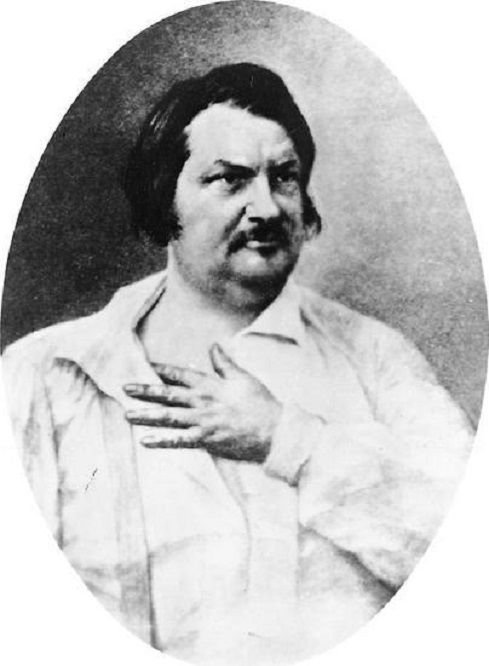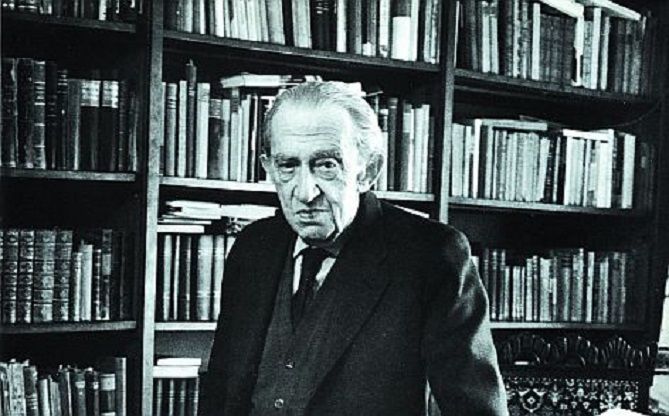Balzac through the eyes of Georg Lukács
Among the literary theorists who are primarily interested in the social nature of art, the Hungarian thinker Georg Lukács who lived from 1885 to 1971, occupies perhaps the most prominent place. Lukács is not just a sociologist-Marxist, who imposes on the artistic phenomena a previously contradictory dogmatic scheme. He has his own conceived concept of human culture, which he perceives as a composite, even a major part of the history of class consciousness. Hence his general understanding of the essence of realism, which sparked such fierce discussions in the thirties of the last century, even to the present day. Drawing from the aesthetic reflection theory and his personal preference for nineteenth-century literature, Georg Lukács dismisses as unrealistic a number of artistic phenomena, even directions in the culture of his past and century - for example Romanticism and Expressionism. So in his essay, he is less concerned with the biography of a writer, not even with the distinctive features of his works, but with his ideas and their significance for the discovery of social reality. Lukács- willingly or involuntarily - expects literature to give accurate account of the facts of the visible life, not the psychic movements of the writer brought about by his human reality. This utilitarian attitude to art stemming from the interests of class struggle is today overcome and perceived as anachronism. Still, the literary studies of Georg Lukács have not lost their significance. Because, like every great thinker, Lukács goes beyond his own ideological system. In his portraits of Balzac, Stendal and Zola, Goethe and Thomas Mann, Tolstoy, Dostoevsky and Gorky, "a deeply personal presence," rich in inner insights, a thin observation, of high spirituality artisticism ".

These particularities in Lukács's thinking are largely determined by his biography. A descendant of an aristocratic family who has received solid education in various fields of social sciences, he is purely intellectual in connection with the struggle of the proletariat. It must be said here that in 1919 - during the Hungarian Soviet Republic - Lukács was a national education commissioner, like Anatoly Lunacharski. After the end of the Revolution, Lukács emigrated abroad, and from 1933 until the end of the Second World War, he lived in Moscow. From this period are his work on the theory of realism, among which a key part is his Balzak essay "Lost Illusions," created in 1935. This is the time when Moscow's demonstrations are being set up against prominent intellectuals and state actors, between which are the names of Nikolay Buharin and Krastyu Rakovski, which is the time when the pseudo-theoretician star Andrey Zhdanov rises from the rostrum of the First Congress of Soviet Writers in 1934, requiring realism reflecting the heroic labors of "worker and the workers, the coworkers, the party functionaries, the businessmen, the engineers, the comraders and the pioneers. "In this troubled atmosphere, when every creator suspected of "antirealism" becomes an automated "enemy of the people," with all the resulting consequences, develops his own views, set in his Balzac essay, and reads that while the later realistic writers show the complete capitalization of the bourgeois spirit, Balzac reveals the initial accumulation in all its gloomy splendor and repulsive essence.
Turning the spirit into a commodity is still not routine and, of course, the spirit itself is not yet routinely boring as a transformation of the spirit into a commodity unfolds before our eyes as a new, dramatically tense event. "Lusto and Blondes (in" Lost Illusions") have seen yesterday what Lucyen has become: writers forced to post The best part of the intelligentsia in the post-Revolution period carries out their feelings and thoughts on the market, the best late color of those ideas and experiences that the bourgeois intelligentsia has been offering since the Renaissance. And this is not just the late color of epigonism: Although the dialectic of the Balzac characters is constantly killing in a sophisticated game with the contradictory nature of being, their spirit has such a breadth and scale, so strange to the provincial narrow-mindedness as never need before in French history. The fact that the bloom of the spirit is at the same time the most repulsive sinking in corruption, prostitution with one another, depersonalization, is the depth of this tragicomedy unbalanced in the history of the bourgeois literature. Indeed, the depth of realism has so far removed Balzac from photographing the weekly reality. Because content determined by content, devoid of any romantic impurities, gives a grim and terrifying fantasy to the whole picture. Only in this sense does Balzac perceive elements of Romanticism in his famous and successful works without becoming a romantic. His fancy is only a radical uplifting of the laws of public reality, their thinking out of the limits of their weekly or even real possibilities for realization; for example, in the Melmoth novel, in which Balzac shows soul-saving as the theme of a winning article whose initial value is falling sharply as a result of overly frequent proposals.

Balzac's fantasy finds a concentrated expression in Votren's image. Certainly it is not by chance that this "Cromwell of the Cossacks" occurs precisely in the novels of Balzac, where the most typical characters in the young generation of the period after the Revolution experience the break from the ideal to reality. So Votren appears in the small room, where Rastynach experiences his ideological crisis; also appears in the Lost Illusions Final, when Lucien, who has lost all hope, materially and morally devastated, attempts to commit suicide. Votren appears here with the same motivated-unmotivated suddenness, with which appeared Mephistopheles in Goethe's Faust or Lucifer in Byron Cain. Votren's function in Human Comedy corresponds to that of Mephistopheles and Lucifer in the mysteries of Goethe and Byron. But times have changed, and not just the devil, the negative principle, has lost his superhuman power and glory, becoming ordinary and earthly, and the nature and methods of his "temptations" have changed. For Goethe, still in the positive light of the great change in the world that has begun by the Renaissance - although it witnesses the post-revolutionary age and magnificently recreates its deepest problems - Mephistopheles is "from that force part that the evil always desires, creates ". For Balzak, goodness is already present only in unspoken dreams. Votrein's mephistophele critique is just a brutal and cynical expression of what he does and is forced to do in this world for anyone who does not want to condemn himself to doom. "You have nothing yet," he explains to Lucien, "you are in the position of the Medici, Richelieu, and Napoleon at the moment when their ambition has begun." These people, my dear ones, have earned their welfare at the price of ingratitude, treason and the brightest variability, and to get everything you need to strive for everything. " The profound cynicism of this view of the world lies, however, only in content. Such thoughts were often expressed before Balzac. But Votren's temptation lies, in essence, in that he expresses his wisdom, inherent in every clever man, without illusions, without ideological coloration. The "temptation" lies in the fact that Votren's wisdom resembles the wisdom of the purest and brightest images in the world of Balzac ... The desperate truth of Balzac is an important, tragic stage in the development of humanism. In the twilight of a transitional epoch, after the dawn of revolutionary bourgeois humanism, and even before sunrise of the emerging progressive humanism, this form of criticism of capitalism was the surest way to preserve the great bourgeois-humanistic heritage, to carry the best part of it in the new development of mankind. In "Lost Illusions," Balzac created the new type of deinjisoning novel, but his work far outweighed the forms that this type of novel had acquired in the nineteenth century. The difference, underscoring the uniqueness of Balzaz's work, is historical: while Balzac shows the initial capitalist accumulation in the field of the human spirit, the writers after him, even the most prominent as Flaubert, are now faced with the complete inclusion of all human values in capitalist commodity relations. Balzac therefore reveals to us the exciting tragedy of the origin, and the writers behind him - the complete process, the lyrical and ironic sorrow to the irreversible. Balzac describes the struggle against the capitalist decline of man, the writers behind him - only one failing world. The Romanticism, overcome by Balzac and preserved only as a moment of the general picture, immediately, lyrically and ironically engages the other writers in realism, silences it, obscures the great driving forces of development and replaces exciting objectivity with emotional and ironic moods and impressions. The moral engagement in the great liberation struggle of mankind is giving way to the sorrow of capitalist slavery; the wrath of wrath against depression becomes a powerless, arrogant, pathological irony. That's why Balzac did not just create this type of novel but also revealed his maximum capabilities. Despite the great artistic virtues of the followers, his further development was still a decline, of course, a socio-historical inevitable decline.
Here is how a thinker from the form of Georg Lukács understands the essence and function of realism in literature in a simple way. He rejects the possibility of a "psychological realism" - according to Dostoevsky's definition. Lukács opposes any subjective deformation of the artistic image because it seems to mask and distort the driving forces in public development, and this would weaken the positions of the proletariat in the class struggle. While in his essay, he is also examining the composition of the novel Lost Illusions, exploring the typical of the images and deeply analyzing the principle that life's chance is becoming an artistic necessity, Lukács's main goal is to reveal the destruction of culture by capitalism in the world of Balzac. This he does with insight, with intellectual power and critical conviction. But today, more than half a century after writing, Lukács's Balzak essay is perceived as an illustrative example of how the tasks of a private science such as sociology are difficult to reconcile with the divergent movements in the history of the human spirit.
Goddamn @godflesh are you just peeling off this level of writing without even breaking a sweat? It all echoes a certain post-Marxist line of thought that saw it's peak in the early 1990s, but one thing your post does remind me of is that these preWWII cats like Lukacs, Benjamin, Adorno and Gramsci were operating at an intellectual level we can hardly touch today. Compared to the Moderns, we are like degraded apes trying to build fire. We might have Google and Steemit, but we are lost when it comes to analogy. I'll have to ruminate on your text for a few weeks but by then my upvote will be worthless.
Thank you for the comment :) And just want to add another great philosopher from postmodernism Aleksei Losev... and Gilles Deleuze and Félix Guattari . Yes, we have satisfaction today with fragmented teachings; in depth it is a really rare thing to go.
Thank Heavens some people are continuously trying to keep up with quality content here.Steemit is so full of shitposts that sometimes it becomes almost unbearable .Thankyou for making useful content man .I'm starting out here and..... wish me luck :P
Thank you :)
I wish you luck with full upvote, hehe :) Sorry, not so much but that is all I can :)
wow! your writing amazed me you are great
keep up the good work
thank you
You got a 9.07% upvote from @postpromoter courtesy of @godflesh!
Want to promote your posts too? Check out the Steem Bot Tracker website for more info. If you would like to support the development of @postpromoter and the bot tracker please vote for @yabapmatt for witness!